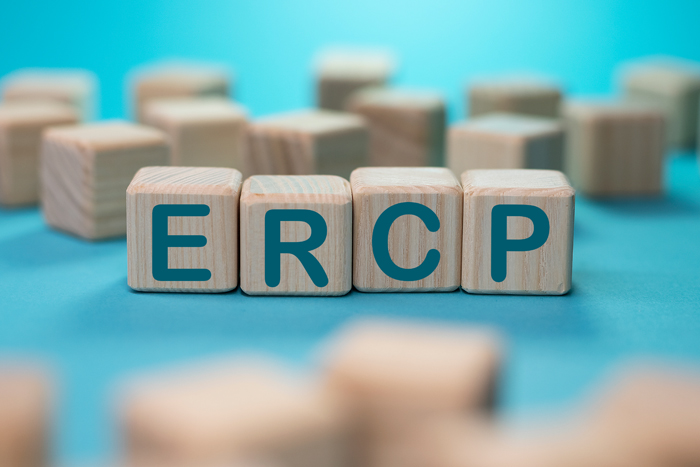ERCP Treatment & Diagnostics in C Scheme, Jaipur
ENDOSCOPIC RETROGRADE CHOLANGIOPANCREATOGRAPHY (ERCP)
Endoscopic Retrograde Cholangiopancreatography (ERCP) is a diagnostic procedure that helps diagnose the gallbladder, biliary system, pancreas, and liver. It represents an alternative method of treatment, particularly for patients with severe biliary pancreatitis. Many randomized studies compare the early ERCP with the conservative treatment in acute biliary pancreatitis. Although the studies are not entirely consistent, ERCP seems beneficial in severe biliary pancreatitis if undertaken by a skilled doctor like the specialists at Apollo Spectra, Jaipur.

What is the procedure of ERCP?
An intravenous (IV) needle will be inserted into your arm to provide a sedative. Sedatives will help you relax and stay calm during the procedure. Either they will ask you to gargle with the anaesthetic liquid, or they will spray the anaesthetic at the back of your throat. The anaesthetic spray will numb your throat and prevent gagging during the procedure. While you lie comfortably on an examination table, your doctor will carefully introduce the endoscope down your oesophagus, through your stomach, and into your duodenum. The camera mounted in the endoscope sends video images into the computer via the data reader. The doctor passes some tools through the endoscope to:
- open the blocked or narrowed ducts
- crush or remove the stones
- remove the tumour in the ducts
The whole procedure takes about 1-2 hours.
What to expect after ERCP?
The Endoscopist will prepare a legit report for the physician. If you are an outpatient, you will be kept under observation until the effects of the medicines wear off. It is normal to feel bloated after the ERCP. Your throat might feel sore for a short time too. After getting discharged from the hospital, you will receive instructions on when to continue your diet and medications.
What are the benefits of ERCP?
ERCP can either completely solve a patient's pancreatic problems (such as pain, obstruction, stones, etc.) or indicate the need for further therapeutic intercessions. Most importantly, ERCP can reduce the risk of other serious complications. It also provides a less invasive procedure than open surgery for the treatment of several pancreatic diseases.
What are the side effects of ERCP?
The side effect and the risk of complications are rare and vary for individual patients. However, the complications include:
- Pancreatitis- is the most common side effect. It usually occurs in almost 10% of the patients who undergo ERCP and needs hospitalization.
- Excess bleeding- can occur while performing a sphincterotomy but is usually controlled by the surgeon.
- Intestinal Perforation- is caused by the endoscope while performing a sphincterotomy. Perforation requires a surgical procedure to repair.
- Infection- occurs in the biliary and pancreatic ducts after ERCP. Treatment usually involves antibiotics, but sometimes, surgical intervention is required.
Who is the right candidate for ERCP?
People of any age can be a candidate for ERCP, including newborns, infants, and adults. Patients with the following problems go through an ERCP:
- Acute pancreatitis
- Chronic pancreatitis
- Injuries to the duct
- Gallstone disease
- Pancrease affected with an inflammatory disorder
- Pancreatic duct blocked by the stones
- Narrowing of the ducts
Request an appointment at Apollo Spectra Hospitals, Jaipur
Call 1860 500 2244 to book an appointment.
No, ERCP is not a surgery but used in conjunction with endoscopic surgery wherein the target tissue has to be removed. ERCP can also act as an alternative to biopsies.
Yes, a sedative will help you relax and stay calm during the procedure.
The effects of sedatives remain long after you have recovered from their anaesthetic effects. You may experience gas formation and nausea.
After ERCP, you will most often stay in the hospital for 1-2 hours after the procedure so that anaesthesia and sedation lose effect. On rare occasions, you have to stay overnight after ERCP.
Our Top Specialities
NOTICE BOARD
CONTACT US
CONTACT US
 Book Appointment
Book Appointment


.svg)
.svg)
.svg)
.svg)








